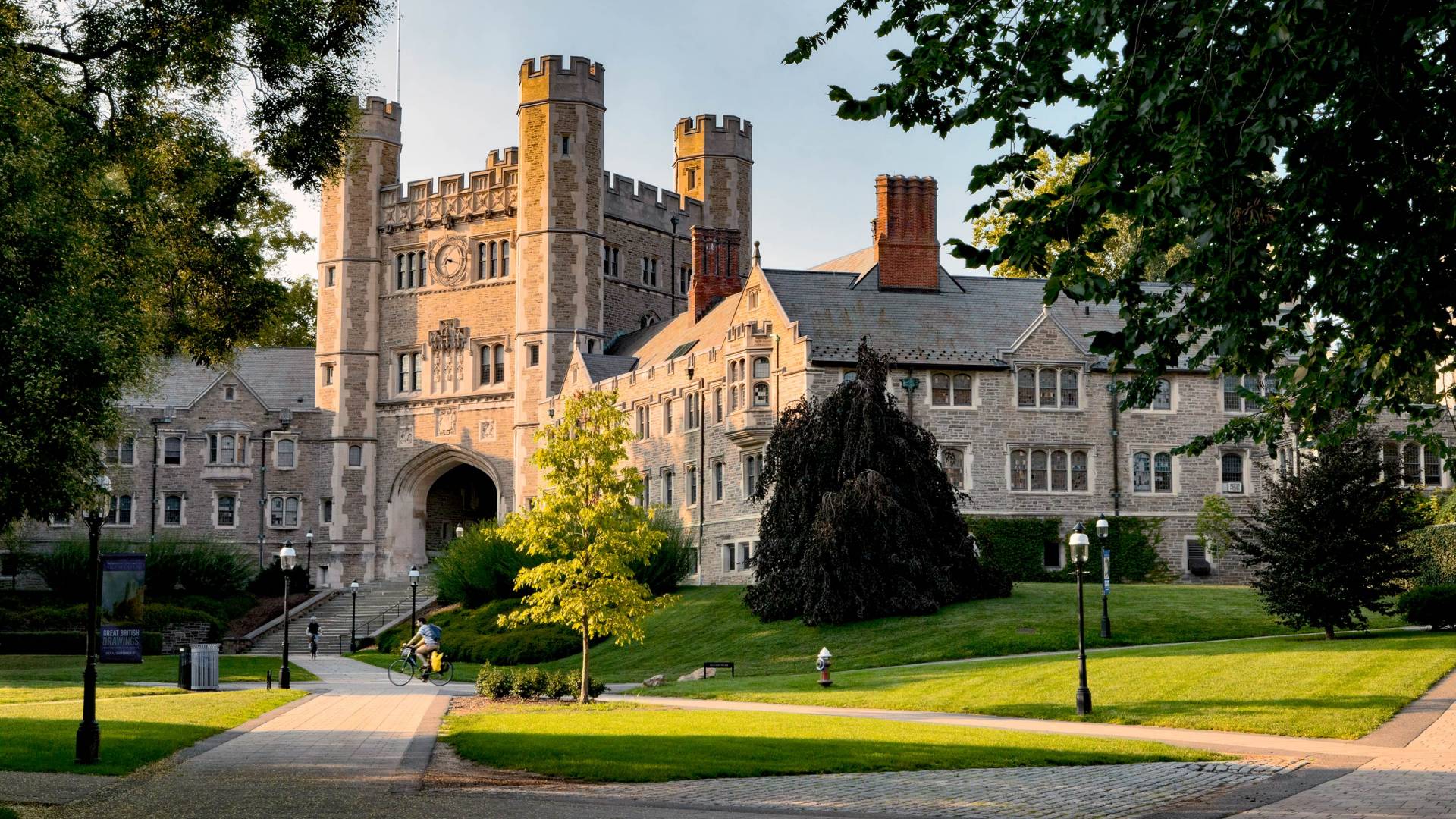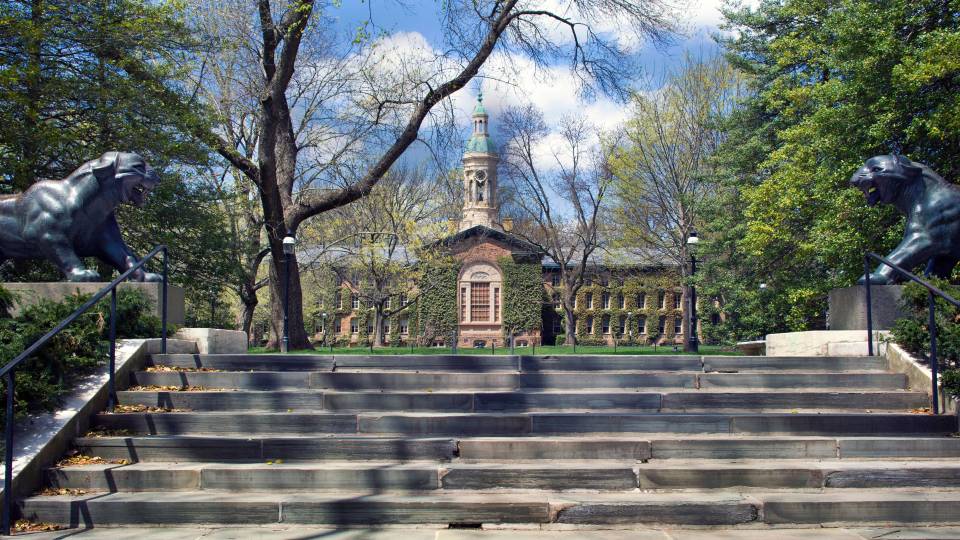Continuing work to address racism includes scholarly and operational initiatives across the University
President Christopher L. Eisgruber has written a letter to the University community to outline the next steps the University administration will take to address systemic racism at Princeton and beyond.
In June, Eisgruber charged the University Cabinet — the senior academic and administrative leaders of Princeton University — to develop plans and proposals on ways to combat systemic racism at Princeton and beyond. He asserted: “As a University, we must examine all aspects of this institution — from our scholarly work to our daily operations — with a critical eye and a bias toward action. This will be an ongoing process, one that depends on concrete and reasoned steps.”
On August 25, President Eisgruber and his Cabinet met for a full-day session to review, discuss, and examine a range of proposals. This discussion was informed by input from across the Princeton community.
On September 2, President Eisgruber updated the University on the Cabinet’s progress, emphasizing that addressing systemic racism means looking at Princeton as a whole, involving both scholarly initiatives and practical operations throughout the University. He noted that the Cabinet’s work on this vital topic “will continue throughout this year and beyond.”
“Princeton contributes to the world through teaching and research of unsurpassed quality, and we must continue to find ways to bring that mission to bear against racism, and against all of the discrimination that damages the lives of people of color.” — President Eisgruber
In his update, President Eisgruber also noted the University’s effort to address systemic racism began with changes and initiatives that were announced in June. These included:
- An initial series of new funding initiatives — the first, immediate steps in an ongoing effort to bring to bear the research, teaching and service-focused mission of the University on the critical issues of racial injustice.
- A new grant program (“Princeton RISE(Link is external)”) that provides immediate resources for undergraduate and graduate students who want to engage in work over the summer to address racial inequalities and injustices. The University has put out a call for faculty-led projects to engage undergraduate students in research or scholarly work that addresses racism, including systemic racism and racial injustice. We have identified funding to support faculty members who want to create or expand course offerings related to systemic racism, racial injustice, anti-racism, and the history of civil rights or anti‑racist movements.
- The changes to the names of what are now the Princeton School of Public and International Affairs and First College.
The Cabinet focused on “the nuts-and-bolts of University management,” that is, the systems undergirding this institution, which is essential to eradicating systemic racism. The Cabinet identified the following initial priorities for collective, University-wide work this year:
• Explore the possibility of a new credit- or degree-granting program that would extend Princeton’s teaching to a new range of students from communities disproportionately affected by systemic racism and related forms of disadvantage
The Cabinet raised a key question about the University’s operations and partnerships: How might Princeton extend its educational mission to reach underserved populations around it?
“As a result of its history and structure, Princeton has none of the degree-granting continuing education, general education, or related outreach programs that exist at almost all of our peers,” Eisgruber said. “This kind of teaching initiative might simultaneously help to address the effects of systemic racism and expand the horizons of our scholarly and educational community. Our growing experience with online learning adds to the tools we might use to enhance such a project.” This will benefit from a University-wide discussion and would require support from the faculty and the Board of Trustees. Provost Debbie Prentice will oversee this effort.
• Assemble a faculty that more closely reflects both the diverse make-up of the students we educate and the national pool of candidates
In seeking to diversify a faculty that “more closely reflects both the diverse make-up of the students we educate and the national pool of candidates,” Eisgruber said the University will “undertake enhanced efforts to expand diversity of the faculty pipeline, and aspire to increase by 50 percent the number of tenured or tenure-track faculty members from underrepresented groups over the next five years.”
To do this, Eisgruber said, the University will build on efforts implemented over the last few years and apply further strategies in identifying diverse candidate pools, encourage academic departments to move into new fields or subfields that might enhance diversity, and allow for increased flexibility by hiring units to conduct searches.
Given the decentralized nature of a university, the involvement and commitment of faculty and departmental leaders to these goals in faculty hiring and graduate student recruitment is crucial. The University’s central administrative leadership is committed to supporting that collective work, while also taking into account the legal restrictions that exist when it comes to these issues.
In work already underway and in other efforts overseen by the Office of the Dean of the Faculty (DOF), academic departments have developed diversity plans outlining the opportunities and hiring directions the department will have, and how they plan to increase diversity within the departments. For example, the DOF has significantly revised faculty search procedures to allow for close involvement by the DOF in tenured/tenure-track searches. Since the hiring process is decentralized — run department by department — close involvement by the DOF helps ensure best practices and an explicit commitment to diversity in the hiring processes. These efforts also include amplification of the role of the faculty search officer in each department: The DOF requires that every department have a search officer who is a tenured member of the faculty and responsible for ensuring demographic information of relevant applicant pools is available and that no underrepresented minority (URM) candidates are overlooked.
The Office of the Dean of Faculty, in partnership with the Office of the Provost and Office of Information Technology, is also working to improve the analysis, use, and reporting of data to inform and sharpen the University’s ability to diversify the faculty and empower departments to be proactive and bolster their recruitment and retention efforts.
Further details on these programs as well as an overview of the faculty search process can be found at the DOF’s website on Diversity and Inclusion(Link is external).
• Establish and strengthen parallel initiatives to diversify Princeton’s postdoctoral researchers, lecturers, visiting faculty, and graduate students
To expand the faculty pipeline and bring diverse talents to the University, it is imperative to increase initiatives that support scholars and researchers broadly.
For example, the Presidential Postdoctoral Research Fellows Program, launched in 2018, focuses on diversifying the pipeline of postdoctoral fellows who will become faculty at leading higher education institutions; encouraging early-career scholars to pursue a career in academia; and recognize and support scholars who can contribute to the University’s diversity, including groups that have been historically and are presently underrepresented in the academy or in certain disciplines. The program has increased the overall diversity of our post-doctoral ranks, including doubling the number of Black post-docs on campus.
The Graduate School and its Access, Diversity and Inclusion team offer a number of programs to recruit and support graduate students from underrepresented backgrounds. This year, the Graduate School launched a new pre-doctoral fellowship(Link is external), to which students from groups historically underrepresented in higher education are encouraged to apply. The fellowship will fund graduate students to study at Princeton for a year before they enroll as first-year Ph.D. students. The Graduate Scholars Program, now in its third year, enhances and supports the academic, social and community development of underrepresented graduate students during their time at Princeton. The Graduate Scholars Program partners with the Presidential Postdoctoral Research Fellows Program and with GradFUTURES, a campus-wide collaborative initiative to expand professional development opportunities for graduate students.
The Graduate School has already made significant progress in diversifying the graduate student body and plans to build on its successes in this area. Over the past 10 years the percentage of domestic graduate students from underrepresented backgrounds has nearly doubled, and the Graduate School again admitted its most diverse class this past admission cycle. This past admission season nearly a quarter of our domestic graduate students who accepted our offer of admission come from groups historically underrepresented in the academy. See our public admission statistics(Link is external).
The new Presidential Visiting Scholar Program, which comes into effect this fall, is intended to support visitors from academic or professional fields who can contribute to the University’s diversity, broadly defined. Visiting scholars who regularly are hosted by a wide range of departments and programs also play a significant role in bringing a diversity of experiences and perspectives to the community.
• Reconceive the Faculty Advisory Committee on Diversity
The Faculty Advisory Committee on Diversity (FACD) is composed of tenured faculty members representing all four academic divisions of the University. This Committee advises the president and the dean of the faculty on issues and initiatives relating to diversity and inclusion related to faculty and more broadly across the University. The FACD supports faculty candidates who can contribute to the University’s diversity, broadly defined, including members of groups that have been historically and are presently underrepresented in the academy or in particular disciplines, such as racial and ethnic minorities and women in STEM. Department nominations are reviewed and approved by the FACD.
• Develop an institution-wide, multi-year action plan for supplier and contractor diversity
Over the past five years, Princeton’s commitment to supplier diversity has produced meaningful results evidenced by a nearly fivefold increase in the proportion of University purchases made with diverse suppliers
We will renew our commitment to ensuring that diverse firms are afforded equitable access to the many purchasing and sourcing needs of the University. We will accomplish this by strengthening our commitment to making purchases through competition, expanding our partnerships with current and prospective diverse suppliers, and building capacity through advocacy and outreach.
• Initiate a trustee-level ad hoc committee, augmented by students, faculty, alumni and staff from the Council of the Princeton University Committee on Naming, to recommend principles to govern changes in naming and other campus iconography
The trustee-level ad hoc committee will be charged “with developing general principles to govern questions about when and under what circumstances it might be appropriate for the University to remove or contextualize the names and representations of historical individuals honored on the Princeton campus.” Trustee Craig Robinson will chair this committee, composed of 11 trustees, two administrators, four faculty members, two undergraduate students, one graduate student, and one alumnus.
Eisgruber’s letter noted that this work will take place “in conjunction with other ongoing efforts to diversify Princeton’s institutional narrative and strengthen the welcoming character of the campus.”
In April 2016, the Board of Trustees adopted the Report of the Trustee Committee on Woodrow Wilson’s Legacy at Princeton(Link downloads document). Since then, the University has undertaken several important initiatives to expand the narrative of Princeton’s history and foster an inclusive sense of place on campus. This summer, the decision by the Board of Trustees to remove Woodrow Wilson’s name from the School of Public and International Affairs was a landmark moment in Princeton’s history.
The Campus Iconography Committee was formed to transform public spaces(Link is external) on campus and honorifically name interior and exterior spaces in ways that reflect and connect with the diversity of the University community. The Portraiture Nominations Committee was formed in 2017 to suggest additions to Princeton’s portrait collections. The portraits commissioned by the University(Link is external) (Link opens in new window) highlight the broad diversity of the Princeton community and recognize significant contributions made by members of the community. Portraits will continue to be added to the University’s collections. A new website, History and Sense of Place(Link is external) (Link opens in new window), represents the evolution of the work of the Campus Iconography Committee.
• Review Princeton’s benefits and policies, including the Tuition Assistance and Child’s Educational Assistance Plan, with an eye to enhancing equity for employees in lower-paid positions and others who might have been disproportionately affected by systemic racism or other class-based disadvantages
Over the course of this academic year, the University will complete a review of policies and benefits, including the Tuition Assistance and Child’s Educational Assistance Plan, with an eye to enhancing equity for employees in lower-paid positions and others who may have been disproportionally affected by systemic racism or other class-based disadvantages.
This comprehensive review will be overseen by two cabinet-level committees: The Benefits Committee, chaired by Provost Debbie Prentice, and the Executive Compliance Committee, chaired by Executive Vice President Treby Williams. The offices of Audit and Compliance, General Counsel, Finance and Treasury, Dean of the Faculty and Human Resources will be primary participants in this work.
• Strengthen support for ongoing anti-racism and diversity-related professional development and other educational opportunities for the campus community
These educational and training efforts will focus on instruction for individuals with managerial or hiring responsibilities, as well as support for inter-group dialogue, inclusive pedagogy, bias response, and training and dialogue experiences for faculty and staff. Some examples include:
- Led by the McGraw Center for Teaching and Learning(Link is external), orientations for new faculty and new assistants in instruction include emphasis on inclusive and equitable pedagogy.
- Institutional Equity and Diversity(Link is external) provides dozens of trainings annually to academic departments, labs, student cohorts and administrative units on unconscious and conscious bias, inclusivity, professional boundaries, etc.
- Human Resources(Link is external) has developed a full set of inclusivity and anti-racism learning resources(Link is external), as well as the Brave Spaces dialogue series.
- The second class of Human Resources’ Inclusion & Diversity Certificate Program kicks off next month.
- Human Resources is preparing a “Learn Something” series on diversity and inclusion that will focus on systemic racism and unconscious bias.
- Faculty can access live and virtual trainings on unconscious bias in searches and admission.
- The 250th Anniversary Fund(Link is external) has made new awards for courses focused on racism and antiracism.
Accountability and engagement
- To provide increased accountability around these goals, we will collect and publish additional data, including an annual Diversity, Equity, and Inclusion report.
- The University will also make enhanced efforts to diversify external advisory committees throughout the University.
- Over the coming days and months, there will be opportunities for community input, dialogue, and discussion and multiple town halls for this purpose during September and October.





